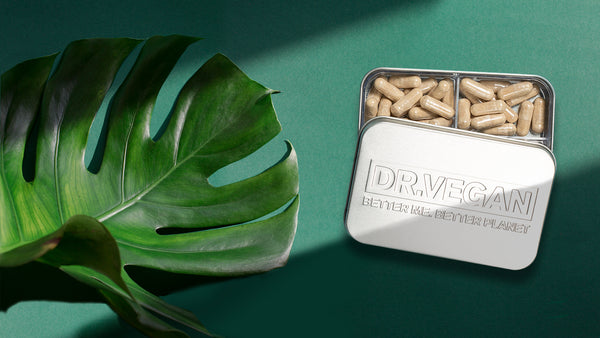The surprising life impacts of PMS - new research

The latest DR.VEGAN® research reveals a shocking 65% of women suffer from anxiety as a result of PMS symptoms (premenstrual syndrome), and half of women feel depressed as a result of their PMS symptoms. With 79% of women saying PMS is not educated well enough in schools, it's about time for progression in women's health.
PMS symptoms can have a debilitating impact on women's daily lives, and it's time that everyone is aware, including men and employers. Our PMS research explores the extent and impact of PMS symptoms, mental health, hormonal changes, exercise, dietary changes, education and the effectiveness of treatments for PMS, reported by real women across the globe.
Nutrition can support and empower women through PMS and the menstrual cycle. A panel of leading experts and registered nutritionists have formulated PMS Hero®, an acclaimed formula for relieving symptoms of PMS allowing women to thrive through their cycle. Customer research shows PMS Hero® is effective for 91% of users*.
Read the highlights from our research and you may also enjoy reading 'What PMS type are you?'.
Most common symptoms of PMS
Our PMS research of over 250 women reveals over 20 symptoms of PMS. Over two-thirds of women experience mood swings and bloating, while more than half suffer fatigue during PMS. You may also enjoy reading about the other common reasons you might be bloated.
% of women suffering symptoms
Symptoms commonly talked about such as 'tummy pain', 'back pain', and 'breast tenderness' impact half of women, whilst other symptoms, including 'brain fog' and even 'depression', are also very common, with half of women reporting these symptoms. Of all the symptoms reported, mood swings, insomnia and depression are reported as the most disruptive to women’s lives.
'Period poo' is also a symptom of PMS - learn more from our experts in 'What is period poo?'.
Mental health impact of PMS
PMS can be much more severe than the occasional mood and tummy ache, as many believe it to be.
65% of women suffer from anxiety as a result of their PMS symptoms, half of women suffer from depression and 43% experience insomnia as a result of their PMS. Shockingly, 98% of the women surveyed do not feel productive or confident during PMS.
Treatment for PMS
There is no one-size fits all cure for PMS, with 16 different treatments for PMS reported by respondents. As expected, the most commonly used treatments are pain relievers such as Ibuprofen and Paracetamol, followed by specialist vitamin supplements to relieve PMS.
Our survey revealed PMS Hero® to be effective in relieving PMS symptoms for 91% of users, and 2x more effective than standard vitamins and supplements.
7 out of 10 users reported relief from mood swings, and 1 in 3 reported having more energy and feeling less depressed when taking PMS Hero®.
PMS Hero® is effective at relieving symptoms for 91% of of users.
Giving into cravings, using a hot water bottle, taking exercise and mindfulness activities are other ways women find relief from PMS.
PMS at school and work
PMS usually starts during puberty, a time when many are still at school. Worryingly, 79% of those surveyed feel that they were poorly educated about PMS at school and felt unprepared to deal with it.
41% of women reported they have taken time off work as a result of PMS, and 78% of women feel employers, schools, universities and teachers do not understand PMS or provide sufficient support for women experiencing PMS.
Diet, blood sugar and PMS
Changes in our hormones can have a big impact on our diet during PMS. 67% of women say they eat less healthily when suffering from PMS, and 68% say exercise is more difficult during PMS.
You may like to read 'Nutrition tips for PMS', written by expert nutritionists.
Discover PMS Hero® | 9 out of 10 recommend it.
Changes in hormones throughout the menstrual cycle, particularly during PMS may cause blood sugar levels to drop which, in turn, creates sugar cravings. These cravings may lead us to make poor dietary choices and reach for foods that may worsen PMS symptoms, including bloating, gas, constipation, fatigue and poor sleep. Learn more in 'How to beat bloating'.
GlucoBalance® is a unique plant-based formula of clinically studied ingredients to manage blood sugar, protecting against the highs and lows of blood sugar and food cravings.
Good foods to reach for during PMS include those with lots of calcium, iron, and B vitamins - learn more in 'Best foods for PMS'.
You can also find out what your diet is missing in our free online Diet Profile - it only takes 3 minutes to complete and shows you how the nutrients in your diet support your health, and where they don't.
Discover our industry-leading research.
Discover our range of vegan vitamins and probiotics.
Want to hear more from our nutritionists? Sign up to our newsletter for more free tips and advice:
*Nationally representative survey in the UK of 252 people online, including 32 PMS Hero users, conducted during November 2022.




